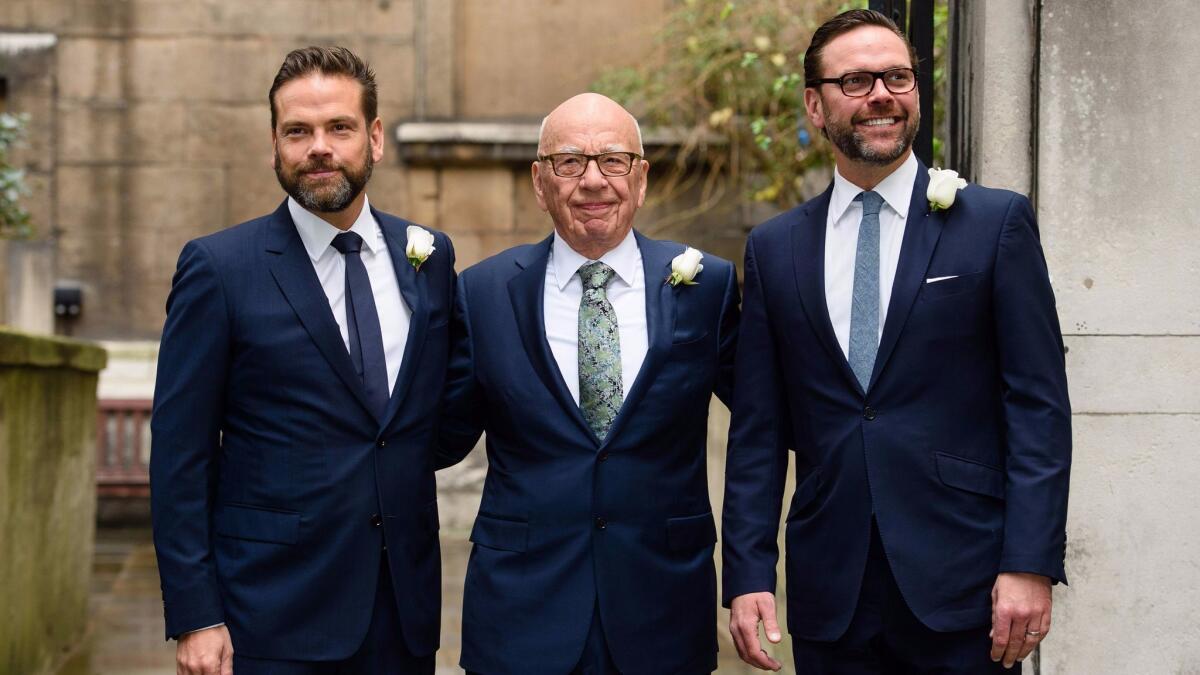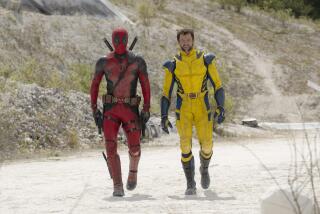Disney considered buying Fox entertainment assets to compete with tech giants

Walt Disney Co. has held talks to buy significant parts of Rupert Murdoch’s 21st Century Fox media company, including its movie and television production studios and a handful of TV channels, according to two people with knowledge of the discussions who were not authorized to speak publicly.
The talks — which were first reported by business news channel CNBC — have stalled, these people said. However, the courtship of two longtime rivals underscores stiff challenges facing traditional media companies as they navigate an increasingly fraught landscape.
Fox shares, which have been swooning for much of the year, jumped nearly 10% Monday following the CNBC report that the Murdoch-controlled company might unload much of its Los Angeles-based entertainment properties, including its storied film and television studio on Pico Boulevard and the National Geographic and FX cable channels. Fox shares closed up $2.48 a share, to $27.45.
Wall Street also was enthused by the prospects for Disney, which has transformed itself with a series of shrewd acquisitions — including Pixar Animation Studios, Marvel Entertainment and LucasFilm — since Chief Executive Robert Iger took the company’s helm in 2005. Disney shares closed up 2%, or $2, to $100.64.
The proposed purchase would have made Disney a more formidable media conglomerate at a time when AT&T is trying to swallow Time Warner Inc., owner of CNN, HBO and Warner Bros. Bulking up also would have allowed Disney to better compete with tech giants such as Google, Facebook, Amazon and Netflix, which has said it plans to spend $8 billion next year creating original content.
“It’s amazing — all of these media companies have awakened,” said Gene Del Vecchio, a marketing professor at the USC Marshall School of Business. “It’s all about owning content and pipelines. And if you don’t have both, you might go out of business.”
News of the discussions comes three months after Iger announced that Disney would be launching its own digital streaming services — one branded with ESPN sports content, which should launch next year, and a second service with movies and television shows produced by Disney. The entertainment channel, which is slated for 2019, will take on Netflix.
Buying parts of Fox, which owns the historic 20th Century Fox studios, would have provided Disney a deep library of programming and such movie properties as “Deadpool,” “Avatar,” “Ice Age” and “Alvin and the Chipmunks.” The TV shows include “Modern Family,” “Family Guy,” “The Simpsons” and “The X-Files.”
“This would give Disney a tremendous amount of great programming,” said Eric Schiffer, chief executive of Orange County private equity firm Patriarch Organization. “This would allow Disney to strike at the jugular of Netflix with devastating force.”
The Fox News Channel, and its portfolio of regional sports channels, including Prime Ticket, would not have been included in a sale, according to the knowledgeable people. Combining two of the giants of TV sports would likely have triggered antitrust concerns by the government.
Fox also would have kept the broadcast network and its fleet of stations, including KTTV-TV Channel 11 and KCOP-TV Channel 13. Disney has its own broadcast network, ABC, and has shown little appetite over the years to bulk up on TV stations.
Giving up its movie studio and much of its television operations would have allowed Fox to concentrate on news and TV sports. The Murdoch family also controls a second company, News Corp., which owns the Wall Street Journal, the Times of London and dozens of newspapers in the elder Murdoch’s native Australia.
Fox representatives declined to comment, and Disney’s spokespeople did not return calls seeking comment.
For New York-based Fox and its controlling shareholders — Rupert Murdoch and his family — selling so many of its signature properties would have been akin to waving a white flag, conceding that it was not in the best position to compete in an era of rapid media consolidation.
The talks come nearly two-and-a-half years after Rupert Murdoch, 86, turned over day-to-day management of 21st Century Fox to his sons, James and Lachlan.
“Fox understands that mammoth scale in the media business is king,” Schiffer said. “And if you are Fox, there is very little for you to buy. The Murdoch sons are savvy businesspeople and they ultimately will do what makes the most sense.”
For Fox and Disney, a marriage of select assets would have solved problems for both. Fox’s film business has had a mixed year at the box office. Though its “X-Men” franchise continues to draw large audiences, the studio has struggled with a handful of aging franchises. Selling the studio to Disney would have reunited many popular Marvel characters such as “X-Men” and “Deadpool.”
Fox’s big-budget summer sequels, “War for the Planet of the Apes” and “Alien: Covenant,” performed considerably worse than predecessors. The studio’s upcoming releases include “Murder on the Orient Express,” a star-studded mystery thriller; and Steven Spielberg’s newspaper drama “The Post.”
Disney, on the other hand, has struggled to develop hit television shows. ABC has been stuck in fourth place in the ratings, behind NBC, CBS and Fox. The ABC Studios just lost its biggest hit-maker, Shonda Rhimes (“Grey’s Anatomy” and “Scandal”) to Netflix.
Three years ago, Fox tried to buy Time Warner Inc. in a hostile takeover but the Murdochs were forced to retreat when their shareholders rebelled, causing Fox’s stock to tumble.
Later Monday, CNBC said there were no current talks underway and others reported that the discussions had collapsed over deal terms, including price. But that news didn’t dampen Wall Street’s zeal for a deal, with some analysts speculating that Fox has hung out a for-sale sign. Other potential bidders could include Apple Inc., Amazon.com or Comcast Corp., the Philadelphia cable company that owns NBCUniversal.
“There is a lot of good strategic logic to doing a deal at this critical time,” Schiffer said. “Unless you have great scale, the market will be brutal. Media has become far more volatile — far less predictable — and the risks are greater than ever before.”
Staff writers Ryan Faughnder and Richard Verrier contributed to this report.
UPDATES:
5:55 p.m.: This article was updated with analyst reaction.
11:43 a.m.: This article has been updated with a response of no comment from Fox.
This article was originally published at 11:25 a.m.
More to Read
Inside the business of entertainment
The Wide Shot brings you news, analysis and insights on everything from streaming wars to production — and what it all means for the future.
You may occasionally receive promotional content from the Los Angeles Times.











